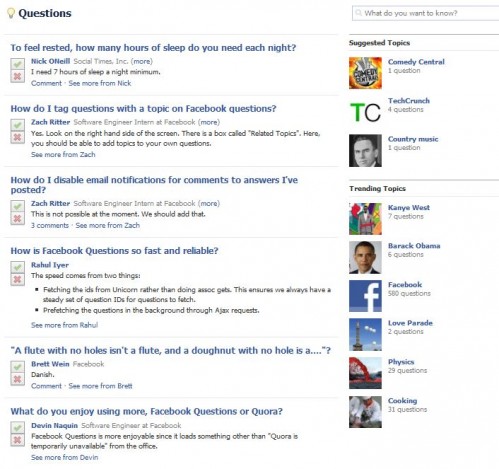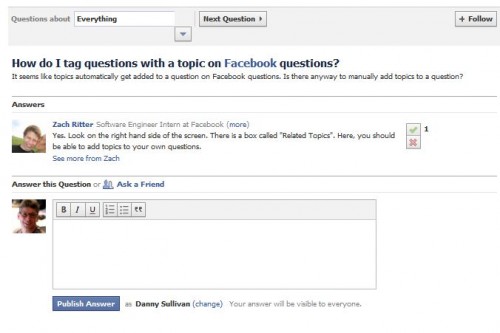Facebook Questions Opens To Limited Public Release
Long expected, Facebook’s new Facebook Questions service is now being offered. It allows Facebook users to specifically ask question to and get answers from others in Facebook’s now 500 million strong community. The service just went live at 1pm Pacific Time today, and we’re working on a detailed look at all the features (this is […]
Long expected, Facebook’s new Facebook Questions service is now being offered. It allows Facebook users to specifically ask question to and get answers from others in Facebook’s now 500 million strong community.
The service just went live at 1pm Pacific Time today, and we’re working on a detailed look at all the features (this is now live, see Up Close With Facebook Questions). That will be posted shortly and linked to from this article. Facebook has a short blog post about the service now, highlighting:
- All questions are made public to anyone, not just to your friends
- Questions can be tagged with keyword to associate them with topics
- You can browse questions asked by topic
How can you use Facebook Questions? Facebook is randomly selecting a small number of its users. If you’re picked, you’ll see a notification that you can now use the service. Over time, Facebook says it will expand the service to more and more users.
Facebook is only the latest in the large number of companies that are offering Q&A answer services, including:
- Aardvark (owned by Google)
- Amazon’s Askville
- Answers.com
- ChaCha
- LinkedIn Answers
- Mosio
- Quora
- Replyz
- Yahoo Answers
Facebook, however, is unique in almost certainly having the largest community of people than any of these services, and a community that is already used to asking questions to others on the social network. That potentially gives it a huge advantage in the space.
Yahoo Answers is arguably the biggest success in the space, at least in terms of traffic. When stats of Q&A services have been released from time-to-time, Yahoo Answers has regularly been ranked tops.
Twitter, while not explicitly an Q&A service sees a huge amount of question asking that happens on its service (see How We Search With The Twitter “Help Engine”), which is one reason why other services like Quora and Replyz tap into Twitter users.
Ask.com is actually reshaping its service into a question answering service, with the first move being a beta launch that happened this week.
As for Google, it is notably deficient in the Q&A space. Google actually closed its own Google Answers service back in 2006, an odd move that happened right when Yahoo Answers was attracting a lot of attention and traffic. But Google Answers was based on a different model, a small group of people who were paid to research answers, rather than being based around a community that voluntarily contributed.
Earlier this year, Google did acquire the Aardvark question service, which has gained many positive reviews. But you’d be hard pressed to realize Aardvark (sometimes called just Vark) even exists if you go to Google itself.
As for Microsoft, that company shuttered it own “QnA” service back in 2009.
Overall, the space is well worth watching, especially in how the smaller search players and new entrants seem to be making gains past the more established companies.
As for searchers, these services can be incredibly useful or a giant waste of time. I’ve encountered many ChaCha and Yahoo Answers “answers” that were unfounded opinions or sometime just flat out incorrect responses, for example. To me, the more a service allows you to connect with a trusted set of contact for advice, the higher quality the answers will be.
For more about this topic and some of the other companies mentions, see:
- The Rise Of Help Engines: Twitter & Aardvark
- Aardvark “Help Engine” Opens To Wider Use
- Will Quora Challenge Google? No. Is It Useful? Yes
- Replyz: See The Questions People Are Asking On Twitter
- Ask Comes Full Circle With “Q&A” Offering
Here’s also a few quick screenshots from the service:
Also see related stories on the Facebook launch from Techmeme.
Postscript: Also see our Up Close With Facebook Questions story that is now up.
Opinions expressed in this article are those of the guest author and not necessarily Search Engine Land. Staff authors are listed here.
Related stories
New on Search Engine Land



